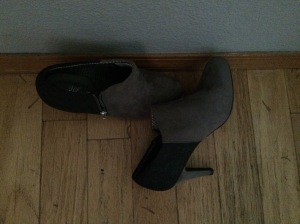Yesterday I was visiting a friend of mine who just graduated from the local community college as a certified Dental Assistant. I have walked through life with this woman for the past 8 years, since her arrival in this country a few months before I returned from living overseas. She arrived as a refugee, and today she is a citizen who owns her own home and car, with a personalized license plate saying her name.
When I first met her in 2011, she had been here about a year. She and her family fled Iraq after they received death threats from a local militia, because she and her husband have a mixed marriage–Sunni and Shia. This is not uncommon amongst Iraqis. She told me of a bullet left on their doorstep, wrapped in paper which said, “The next bullet is for you.” She also told of being outside in her own garden after curfew in a town where there was fighting between Iraqi and American forces. She was carrying her one-year-old and walking through the garden at dusk, when she became aware of a red sniper’s mark wobbling on the child’s back. She rushed inside to relative safety. They have many family members who were not so lucky.
The family went to Egypt, where they hung on for the 5 years it took the UN to process their case. This amount of time is not unusual. Refugees are severely vetted, and there were a lot of them even 10 years ago. But as refugees, they could not legally work. My friend sold the gold she’d received as a bride bit by bit, just to help the family survive. When they were approved, they were told they would be coming to America. They were assigned a state, a city, and a receiving organization, and they arrived to begin a new life in a place where they didn’t know the people, the language, the culture, or even the climate.
I walked with this friend through years at the local community college. She took only one term off, a summer class to deliver her youngest child. We got her through 8 levels of ESOL, which was cause for a party! Then she took other classes towards her Associate’s degree. She took medical terminology and passed with a high A, learning words I’d never heard of. She took zumba, and for her final produced a dance using the bellydance moves of her own culture. Every class she took, she found a way to somehow feed everyone in that class at least once. Meanwhile, I was often invited to parties hosted at her house–for birthdays, or Ramadan, or for her twins’ high school graduation. Every milestone was celebrated with lots of food and dancing.
Her husband got turned down for job after job, due to a lack of English skills. He was too impatient to stay in school; he wanted to work. So, in the time-honored tradition of immigrants, he started his own business.
They bought a house. They gained their citizenship. Her elderly in-laws were not granted a visa to visit them here because her father-in-law could not remember the name of the suburb listed as their address; he only knew the state. This was deemed suspicious. So the in-laws traveled to Jordan, and the family traveled from here to Amman to meet with them in a safe place.
Through hardship after hardship, I watched their perseverance and resilience. She used to shriek at fireworks because of PTSD from surviving war after war; now she buys small ones for her kids, and travels downtown to see the big ones set off over the water. She used to cook delicious food with lots of oil and deep frying, but after a class on nutrition she has learned to change that, although her food is still delicious. She is so generous to me that I can’t come close to keeping up. She lavishes her friends with gifts, celebrations, and joy, but I have also seen the pain and sorrow she carries.
I admire her deeply. And her story is just one of many that I know. In some ways she is exceptional, but in other ways, she typifies the determination and tenacity of new arrivals who struggle through their culture shock and PTSD and get up every morning to go to class, or to work, or to care for their families; who just keep going.
I heard on the radio yesterday that the number of refugees worldwide is the highest ever–70 million. That number is so high that it’s nearly meaningless, it’s so hard to wrap our minds around it. But I can tell you that number represents stories and people like this family I’ve been telling you about. Refugees in general are people who were living normal lives, mid-career, with houses and cars, only to have that taken away from them. By definition, they are ones who are the victims of war, not its perpetrators.
And so on World Refugee Day 2019, I want to celebrate the courage I see in my friends, who have come through unimaginable trauma and yet who take every opportunity to gather and celebrate life. I’m honored to be their friend. And I want to call out to the stable countries of the world. There is so much more we could be doing to relieve suffering and bring hope. There is so much room at our table. Won’t we open the door?
